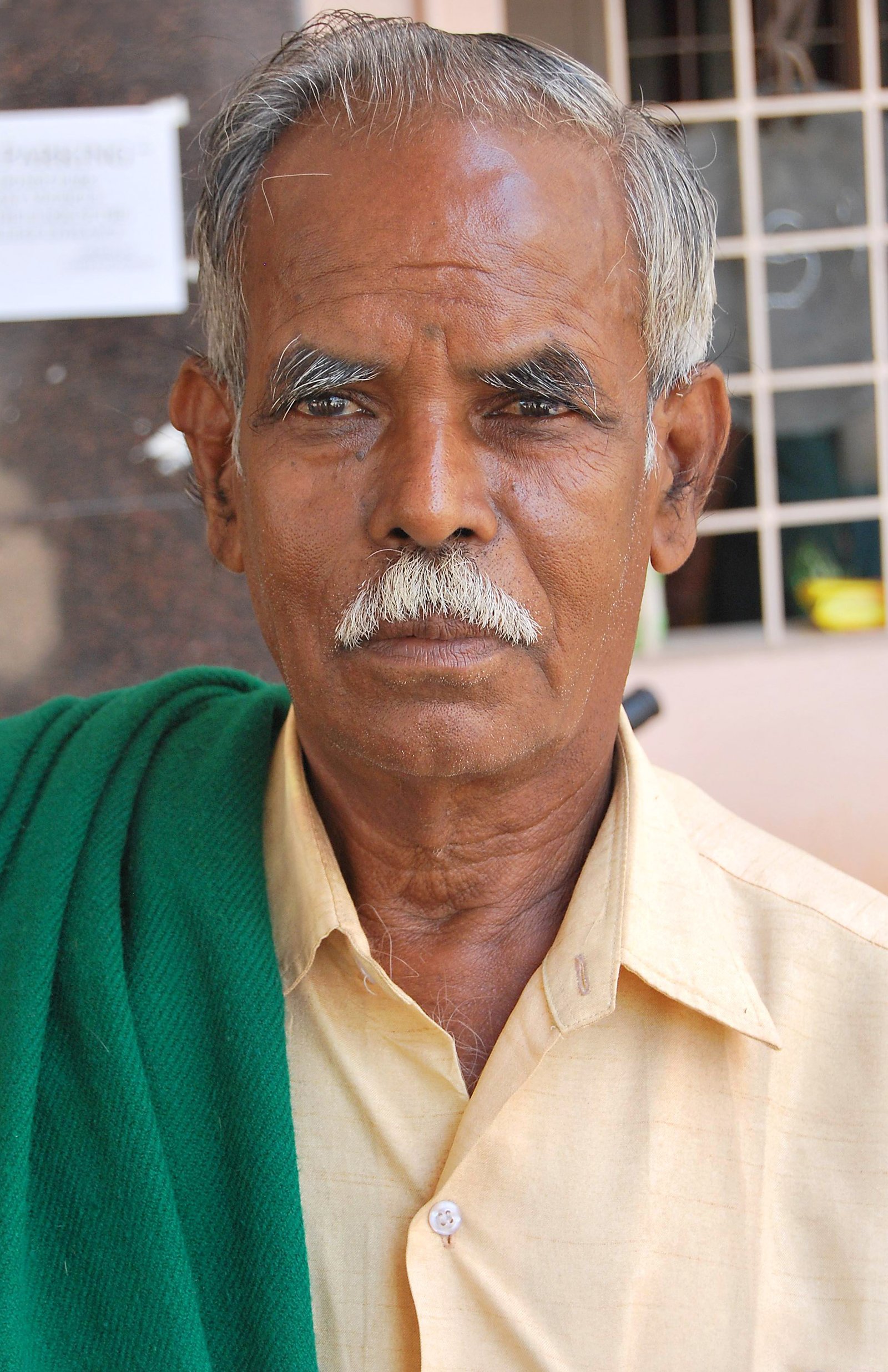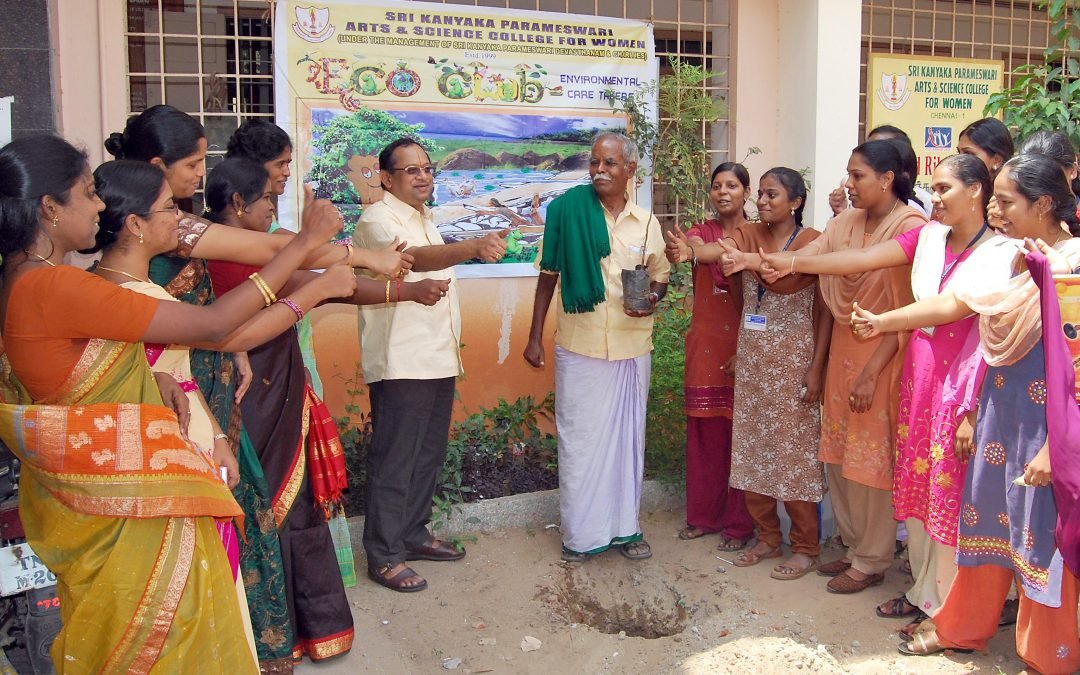Read in : தமிழ்
Lucky are those who find their purpose in life. Many think their purpose is to earn, raise a family, have a house and enjoy material things. Some, however, want to care for people and things around them. For them, the society, the environment, and the whole world are important, so future generations have a better place to live in.
Thangasamy, for instance, is a farmer in Pudukottai who believes trees are the farmer’s best friend. He passionately tells farmers, heads of educational institutions and industrial houses that they should grow trees.

When someone calls Thangasamy on the phone, they are likely to hear a soft voice saying, “Hello I am maram speaking.” For Thangasamy, the tree is his body and soul. His connection with trees is so deep that he even talks to them.
The everyday routine of Maram Thangasamy, who is well into his 70s, is to go around his farm and talk to each one of the trees he has planted. He strongly believes trees have feelings and can respond to love and care. His knowledge of trees is so encyclopaedic that even forest department officials take him with them to help them identify trees they are unfamiliar with. “All this comes from experience. What is the use of bookish knowledge if it is not backed by practical experience?” he wonders.
At his farm, Maram Thangasamy doesn’t wait for formal introductions but goes straight to the heart of the matter, or rather his heart of the matter.“Have you seen God,” he asks? He laughs and tells the surprised visitor: “Come, I will show you God.”
He ties the visitor’s eyes with a cloth, holds our hand and leads us into a small room. Here he asks us to remove our blindfold and stare into a big mirror. “See, this is God. You are God. He is nowhere else but within us. Then why are we, who are supposed to protect and preserve our natural resources, constantly destroying them?” he asks.
The question, though a tad simplistic, often strikes a chord with the visitors. Next he asks the visitors to plant a seedling and water it. He names the tree after the name of the person who planted it. “Remember the person has planted you with a lot of hope that you will grow well. You should fulfil his expectation. Raine or shine, storm or drought, you must survive, fight the odds and grow well to keep up his name,” he tells the seedling with much love.
Thangasamy strongly believes that if Tamil Nadu farmers start growing trees then water scarcity or drought will never affect the state. “The reason for the water scarcity we face today is our own doing. Mindless cutting of trees and cementing the place around our homes prevents water seepage into the ground. In the name of development and industrialisation trees are being cut in thousands. I keep telling people for every one tree cut, they should plant 10 saplings. Only if this is implemented can we somewhat rectify the damage caused to the ecosystem in the last several decades. If even now we do not realise this danger then in another 30 years Tamil Nadu will become a desert like Saudi Arabia,” he cautions.
Thangasamy owns 25 acres altogether: 12 around his home and the rest in another place. He has been practising alternative farming for the past 15 years. A strong supporter of organic farming, he says that before he turned organic he faced enormous losses. Today he is convinced that agriculture should be in harmony with nature as otherwise it has negative effects on farm resources, like a continuous fall in the watertable.
He also believes that soil has life and should not be treated with ‘poison’ (agrochemicals). Fodder for the cattle and sheep is grown on his farm itself.
He is cultivating nearly 125 species of trees on the 12 acres near his home. As these trees have different physical features like different canopy levels and root lengths, they assist each other and enrich the soil in a wholesome way.
He grows crops like paddy, groundnut, black gram and daincha, in rotation on the 13 acres. Gingelly, chillies, banana, guava, coconut and other fruit trees are also grown. Crosandra, sappayru and calophogonia are cover crops, so there is no need for weeding. He also grows about 100 species of medicinal herbs.
He does not clean the fallen dried leaves or plough the field. He leaves the leaves to rot, thereby supplying the crops with rich nutrients. He feels that weed come up only if the fields are ploughed.
Small tubs are placed in many places in his tree garden so that the birds which come to drink water feed on the pests and leave their droppings. Additionally, he has prepared a liquid with plant products like neem cake, erukku (calotrophis) and kanchara, and keeps it in different places on the farm. Insects attracted by the smell fall into the pots and die. He has not faced any major pest problem during the last five years of organic farming of paddy.
Fluctuations in income and occasional losses from agricultural crops can only be offset by income from tree crops like teak, rosewood, etc which he considers a great wealth that he is accumulating for future generations.
He holds the following precepts to be important for the practice of organic farming: a) Nutrition should be given to the soil and not to crops; b) Cultivation should be for the food requirements of the farmer and for the health of the soil; c) Crop rotation and mixed cropping are essential; d) Trees are necessary components of a farm and the family must live on the farm; and f) Sustainable agriculture is practical to the extent that one integrates plants, animals, micro-organisms and other organisms.
He has planted several lakhs of trees and has lost count of the numbers. “Numbers are of no use to me. Till I die I will keep on planting,” he says.
Many people in the region say that the road between Pudukottai and Tiruchi has huge trees on both sides of the road. All these have been planted by none other than Thangasamy.
Thangasamy can be reached at KarpagaSolai, Sendhangudi, Nagaram Post, Alangudi Taluk, Pudukottai, District – 614 624, Tamil Nadu, mobile:097866 04177.
Read in : தமிழ்











